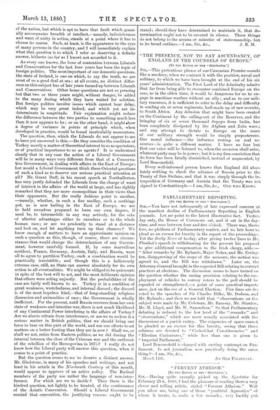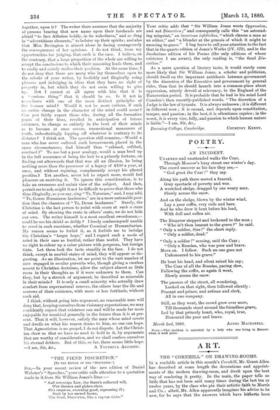"FERVENT ATHEISM."
[TO THE EDITOR OF THE "SPECTATOR.")
SIR,—Having quite casually picked up the Spectator for February 21st, 1880, I had the pleasure of reading there a very clever and telling article, styled " Fervent Atheism." Will you allow me, being one of those "youthful Agnostics " of whom it treats, to make a few remarks, very hastily put
together, upon it ? The writer there assumes that the majority of persons bearing that new name upon their foreheads are afraid "to face Atheism boldly, in its nakedness," and so drag in adventitious elements," to bolster up their spirits ; and also that Miss Bevington is almost alone in facing courageously the consequences of her opinions. I do not think, from my opportunities for judging, that such is the case. I believe, on the contrary, that a large proportion of the whole are willing to accept the conclusions to which their reasoning leads them, and to coolly and calmly realise their position. At the same time, I do not deny that there are many who lay themselves open to the rebuke of your writer, by foolishly and illogically using phrases and indulging in ideas that they have no right of property in, but which they do not seem willing to give up. But I cannot at all agree with him that it is a curious thing" that it should be so. Is it not in accordance with one of the most distinct principles of the h uman mind ? Would it not be more curious, if such an entire change in the character of the mind could occur? Can you fairly expect those who, during all the formative years of their lives, revelled in anticipation of future existence, to change so entirely in the bent of their minds as to become at once severe, unemotional measurers of truth, unhesitatingly lopping off whatever is contrary to its dictates ? I think not. The question still remains,—Would a man who has never suffered such bereavement, placed in the same circumstances, find himself thus " cabined, cribbed, confined ?" To use but a poor analogy, would a man bred up in the full assurance of being the heir to a princely fortune, on finding out afterwards that that was all an illusion, he being nothing more than the possessor of a legacy of £100 a year, at once, and without repining, complacently accept his altered position P Yet another, never led to expect more, would feel pleasure on receiving it. To ignore this consideration, is to take an erroneous and unfair view of the subject. And then, permit me to ask, might it not be difficult to prove that those who thus illogically, as you say, sing " Te, Naturam," and, I may add, " Te, Genus Humanum laudamns," are in a more untenable posi- tion than the chanters of " Te, Deum laudamus." Surely, the Christian is the last person to point with scorn at such a state of mind. By showing the rents in others' coats, we do not hide our own. The writer himself is a most excellent swordsman,— could he use his shield as deftly ? I freely confess myself unable to revel in such emotions, whether Cosmical or Humanitarian. My reason seems to forbid it, as it forbids me to indulge the Christian's "larger hope," and I regard such a mode of mind in their case as hurtful, rather than useful. They have no right to colour up a sober picture with gorgeous, but foreign tints. Let them look the facts steadily in the face. I do not think, except in morbid states of mind, they will appear so dis- gusting. As an illustration, let me point to the vast number of men engaged in secular pursuits who, though giving a careless assent to Christian doctrines, allow the subject almost as little room in their thoughts as if it were unknown to them. Can they, but by a stretch of argument, be described as miserable in their minds ? It is only a small minority who actually draw comfort from supernatural sources, the others bear the ills and sorrows of their existence, with more or less fortitude, without such aid.
I think, without going into argument, no reasonable man will deny that, keeping ourselves from visionary expectations, we may confidently expect that existence can and will be made far more enjoyable for mankind generally in the future than it is at pre- sent. That it will, however, satisfy the man whose mind covets and dwells on what his reason denies to him, no one can hope. That Agnosticism is no gospel, I do not dispute. Let the Christ- ian show us that we have no need to hold to it, by arguments that are worthy of consideration, and we shall confess ourselves his eternal debtors. But of this, so far, there seems little hope.



































 Previous page
Previous page